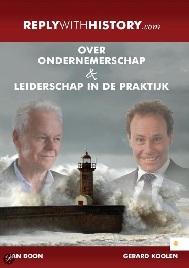veronika
59. Spread of activities, no dependence on one client
Hi Gerard,
This week I got a call from a friend who works for a large maintenance company at TATA IJmuiden. They have been told that all contracts will be withdrawn with immediate effect. This is probably linked with the ongoing wage negotiations, the unions have requested a 3% pay raise, and also with the severe economic circumstances in which the steel industry finds itself. This is disastrous for smaller businesses which depend entirely on TATA and the continuity of their businesses is directly at risk. (more…)
58. Responsibility
Dear Jan,
I see another benefit of the crisis. I believe that one of the positive consequences of the crisis will be that suppliers will be forced by their clients to take more responsibility for the product or service delivered. (more…)
57. Unexpected events, flexible anticipation
Dear Gerard
Analyzing your strategy adjustments of your company in response to the 2008 crisis I can say you are definitely a Jugaad innovator. By “doing more with less” your company will make more profit, as the crisis comes to an end. (more…)
56. Krinomai
Dear Jan,
Maybe I’m also a Jugaad entrepreneur. After the 2008/9 crisis, which the company felt most strongly in 2009, one thing became very clear to me. Something had definitely changed. Sometime in 2009, I googled “crisis” and I found it probably originates from the Greek word “krinomai” which means “moment of truth” or “the moment when a decision must be made with a major impact on the future”. In China, the character for “crisis” also means “opportunity” and in ancient biblical translations, the word crisis is directly linked to the word confidence. (more…)
55. The new reality
Dear Gerard,
Last week I saw a trend watcher on TV. He discovers trends by traveling, speaking with CEOs and universities and so on. The trends he identified emerged from the crisis of 2008-2013: austerity, increased recycling and more clumping. It is interesting to see that in a country like India and other emerging countries, the innovations resulting from this are referred to as Jugaad, which means “do more with less.” The most striking aspect of the Jugaad innovators is their way of thinking about thrift. These entrepreneurs are trying to offer more value at a lower cost, and continuously adding value. This stems from a rational response to the scarcity which is constantly present in their environment. Jugaad for entrepreneurs is the only way to survive. (more…)
54. Inspiration
Dear Jan,
I know very few businessmen in my environment that made their fortune quickly. And those that did often also lost it quickly. I also meet many entrepreneurs starting up businesses with the idea of selling them within a couple of years for a lot of money. It always strikes me that for these people the activity of the company is secondary to the final sale of the company. The focus is only on money. There is no passion for the product or service. There is no thought for the users, the customer, suppliers and employees. (more…)









